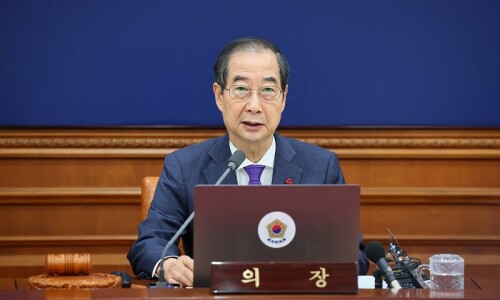WASHINGTON: The United States will be “very supportive” if conditions are created for productive talks between India and Pakistan, says senior US diplomat Alice G. Wells.
Ms Wells, who heads the bureau for South and Central Asian affairs at the State Department, also said at a news briefing on Monday that the United States had sent a two-pronged message to Pakistan: a desire to engage constructively and an emphasis on the need for Pakistan to implement its promises to fight all terrorist groups.
Asked if Pakistan had sent a message through US Secretary of State Michael Pompeo on India-Pakistan dialogue and if that was raised during Mr Pompeo’s meeting with the Indian foreign minister, she did not say if such a message was received and delivered.
Secretary Pompeo visited both Islamabad and New Delhi last week. In Islamabad, he met Prime Minister Imran Khan, other members of the new government and Army Chief Gen Qamar Javed Bajwa.
In New Delhi, he participated in the Two-plus-Two talks between India and the United States. The US military chief, Gen Joseph Dunford, accompanied him on both the visits.
Alice Wells identifies communication channels the neighbours are already using
Apparently, the two visits were not linked but media reports claimed that Islamabad did ask Mr Pompeo to convey its desire to Indian leaders for restarting talks between the two neighbouring states.
“In general, the United States supports dialogue between India and Pakistan that can reduce tensions,” said Ms Wells, without confirming or denying if Islamabad had sent such a message.
“We understand and had frequent conversations with the Indian partners on the expectations that there would be demonstrable reduction in cross-border terrorism or infiltration that would help create the confidence for dialogue to take place,” she added.
Ms Wells said the US had also welcomed the positive messages that were exchanged between Prime Minister Khan and Prime Minister Narendra Modi after Mr Khan’s election and deferred to the two governments on how they could build on what were already existing structures.
She also identified the channels of communication that the two neighbours were already using, such as the dialogue between their national security advisers and the DGMOs, and the people-to-people ties that have been sustained through a bus service.
“And so, this is if the conditions can be created for productive bilateral conversation, obviously we would be very supportive,” she said.
Asked if Secretary Pompeo had returned with the impression that Pakistan had the intention to fight terrorism, Ms Wells said the secretary’s visit to Islamabad was an opportunity to meet the new civilian leadership early in its tenure to “describe the aspirations we have for the bilateral relationship”.
Secretary Pompeo, she said, also described to the new Pakistani leadership how the US would like to work with Pakistan to establish stability and a political settlement in Afghanistan.
“And [explained to them] that the nature and quality of our bilateral relationship was obviously going to be a function of whether we saw Pakistan take meaningful steps to halt support for the terrorist proxies that operate on its soil.”
Ms Well said that Secretary Pompeo also conveyed “our concern that we haven’t seen since the President [Donald Trump’s] announcement of the South Asia strategy, the kind of decisive steps and sustained steps we believe are necessary to provide the appropriate incentives to convince the Taliban to go to the negotiating table”, she said.
She added that Secretary Pompeo appreciated the constructive conversations that he had in Islamabad, but “the emphasis is on seeing action, beyond rhetoric into actions that are understandable and measurable by the US and all the other 40 countries involved in Resolute Support Mission” in Afghanistan.
Published in Dawn, September 12th, 2018

















































